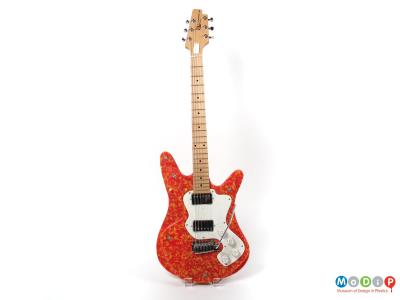This exhibition proves that recycled plastics can be made into a wide variety of things, from the everyday, like a carrier bag, to the more unusual, like this Cyclotron guitar (1) designed and made by Simon Lee. Lee originally trained as a sculptor and worked as a prop and model maker for the theatre, film and television industries for many years. He then retrained as a guitar maker at Merton College.
Guitars, both electric and acoustic, are traditionally made from wood, often tropical hardwoods from endangered rainforests. Lee was unhappy to contribute to the devastation of unsustainable rainforests and wanted to find a more environmentally friendly material:
Instead of producing highly lacquered, exotic timber 'furniture' guitars, I [design] instruments that explore the potential of, and celebrate very modern materials.
The material a guitar is made of can help to create and resonate the tone that that instrument makes. Even different types of wood create different tones, which is why guitars range in price. The use of rarer, denser wood gives a better tone and results in a more expensive guitar.
In the Cyclotron, Lee uses a sustainable maple wood core which supports the neck, pickup, bridge and control cavity, and a front and back plate made from recycled off cuts of industrial pipe giving the distinctive 'chilli' colouring. The recycled plastic sheets from which the plates are cut, are made by Smile Plastics, have a consistent structure and density. This means the material is more reflective and less damping than wood giving the guitar good tone and sustain.
To create the recycled plastic sheet, Smile Plastics put a measured amount of flaked, sorted, waste plastics into a rectangular shaped mould which is then put into a hydraulic press. Through a process of heat and pressure, the individual flakes of plastic fuse together and take the shape of the mould. Most of Smile's sheets are made of 100% waste plastic with no binding agents or resin; it is simply the combination of heat and pressure that transforms the flakes into solid boards. It is believed that this process of recycling uses between 50% and 70% of the energy that would be used to create sheets of virgin material and as Smile does not melt the material completely it gives off no noxious or harmful fumes whilst it is being pressed.

